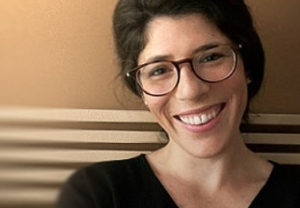 Dr. Lena Neufeld has worked with children, teens and young adults for the past 10 years, everywhere from the rural Oregon desert to the maple trees of Vermont. Now, Lena is Jewish Family Service’s new Teen and Young Adult Therapist in Seattle—and the first counselor brought on as part of our new Teen & Young Adult Program (TYA) to improve youth mental health.
Dr. Lena Neufeld has worked with children, teens and young adults for the past 10 years, everywhere from the rural Oregon desert to the maple trees of Vermont. Now, Lena is Jewish Family Service’s new Teen and Young Adult Therapist in Seattle—and the first counselor brought on as part of our new Teen & Young Adult Program (TYA) to improve youth mental health.
We sat down with Lena to talk about her background and what brought her to JFS, as well as the new TYA program and how parents can work with their teens to address and overcome mental health challenges.
What brought you to Seattle and to JFS?
I’m from New York originally but grew up visiting Seattle often throughout my early teens. I would initially come with my family, but as I got older I began taking solo trips to the area to explore the amazing hiking trails and many other extraordinary nature opportunities that the Pacific Northwest has to offer.
When I heard about the opportunity at JFS, I was incredibly excited for the possibility of returning to Seattle and working for an organization that I had heard so many positive things about. Upon coming to JFS for my interviews with the Counseling Services team, I was struck by how personable and unique every staff member was. At the same time, however, the group clearly had a cohesiveness that is rare to find. I felt a connection with them right away!
Now, I’m so excited to work at JFS and help build the new TYA program. I’m looking forward to helping teens, young adults and their communities build the best lives they can together and develop the emotional awareness tools they need to become independent, happy and healthy.
What do you attribute to the rise in mental health challenges among youth?
It’s interesting because that rise has actually been climbing for quite some time. There are many hypotheses as to why, but the truth is the research is correlational, so we don’t have a crystal-clear answer. I do think that increased technological advances, such as social media, have a lot to do with it. For many users—the majority of whom are young people—social media can lead to increased isolation and pulling away from the rest of the world. This in turn can contribute to feelings of depression or anxiety.
While that isolation impacts everyone, it can hit teens and young adults particularly hard. At that stage of development, in-person interactions are so crucial for young people to understand themselves and others. Social media apps and channels provide online spaces to connect, but they’re not at all the same as those face-to-face experiences that teens and young adults need for healthy development.
What makes teen and young adult counseling different from counseling for adults?
On one hand, teen and young adult counseling is very different, and on the other hand there are so many similarities. At the end of the day, the goal for everyone going into counseling is to live the best life they can. That doesn’t matter if you’re working with a three-year-old or an eighty-five-year-old—it’s universal. I like this idea of “living your best life” because it gets away from the idea of “sick vs. healthy,” or the idea of perfection. The reality is that perfection does not exist—but living a life that is meaningful to you certainly does.
How can parents address the stigma that exists around mental health, specifically for youth?
Stigma is so real and alive—while I think we’ve come a long way in terms of addressing it, the bottom line is that there is still a tremendous amount of work to be done. I think many of these perceived negative messages (i.e. “going to therapy,” “taking meds,” “being crazy,” and so forth) are internalized and unconscious.
For parents, there may be some shame and embarrassment around the topic that they may not even realize. For teens and young adults, there can be a fear around what peers will think if they find out that someone is seeing a therapist or counselor. The best thing that parents can do is talk openly with their kids and explore options together.
What advice would you give to a parent or teen who is hesitant about mental health counseling?
It’s common to face some reservations—from either child or parent, or both—around mental health counseling. I would recommend starting off by exploring that hesitation first. I think it’s very important to hear what a person’s specific concerns are and then respond to them individually, because it can be different for everyone. These conversations may be difficult to initiate, but from my experience it is always better and healthier to give counseling a try early on than to let the issues develop into more serious concerns down the road.
Interested in finding out more about our mental health counseling for teens and young adults? Please visit https://www.jfsseattle.org/get-help/teen-and-young-adult-counseling/ to learn more.



